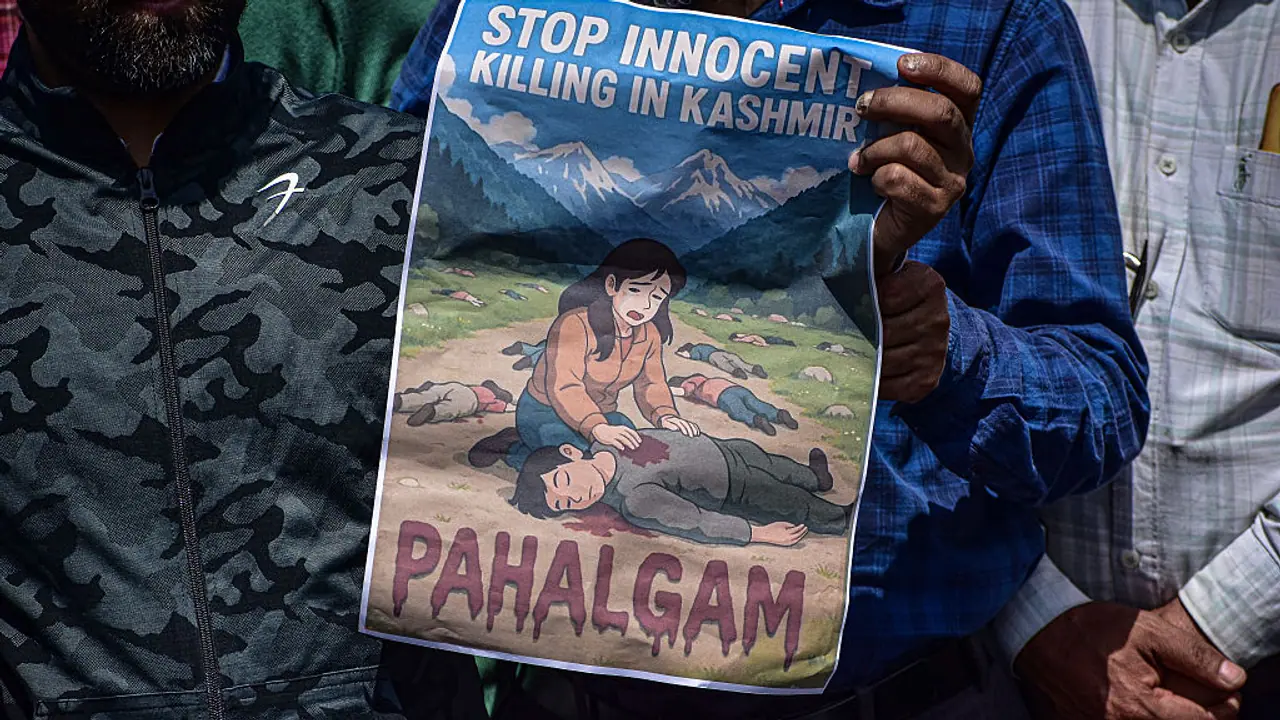Rajnath Singh refused to sign the SCO communique after it ignored the Pahalgam terror attack and India’s concerns over Pakistan-backed terrorism, exposing China and Pakistan’s double standards on terror.
When Defence Minister Rajnath Singh refused to sign the Shanghai Cooperation Organisation (SCO)’s joint communique on Thursday in China's Qingdao, it wasn’t just a diplomatic protest. It was a decision rooted in outrage — and memory. Outrage over the world's indifference to Pakistan-backed terror, and the memory of what happened in Pahalgam.

In that quiet corner of Kashmir, terrorists gunned down 26 innocent tourists after identifying them by religion. Singh’s message was clear: India would not be party to any document that whitewashes the blood spilled in Pahalgam — or the hands behind it.
“Some countries use cross-border terrorism as an instrument of policy and provide shelter to terrorists. There should be no place for such double standards,” Singh declared, adding, “The SCO should not hesitate to criticise such nations.”
Pahalgam: The Attack No One Wanted to Talk About
The communique circulated at the SCO defence ministers' conclave made no mention of the Pahalgam terror attack, where innocent lives were lost in a targeted act of hate. The omission was not just diplomatic apathy — it was complicity by silence.
“The pattern of the Pahalgam attack matches with LeT's previous terror attacks in India,” Singh said, directly naming Lashkar-e-Taiba — a group that continues to operate openly in Pakistan with the blessings of its military-intelligence establishment.
India’s Operation Sindoor, a swift and bold military retaliation, was not only a response to this atrocity but a message to those who believe they can orchestrate terror from across the border with impunity.
“It includes our right to defend ourselves against terrorism. We have shown that epicentres of terrorism are no longer safe and we will not hesitate to target them,” Singh warned.
Pakistan in the Room, But Still in Denial
Singh didn’t flinch from addressing the elephant in the room — Pakistan, represented at the summit by Defence Minister Khawaja Asif. He made it abundantly clear that terrorism is not an abstract idea — it is sponsored, financed, and nurtured by states. One state in particular.
“It is imperative that those who sponsor, nurture and utilise terrorism for their narrow and selfish ends must bear the consequences," he said.
China’s Silence Is Not Neutrality — It’s Enabling
China’s Defence Minister Dong Jun sat through Singh’s address, unmoved. Beijing, which regularly shields Pakistani terrorists from international sanctions at the UN Security Council, once again chose to play protector rather than peacemaker.
“Certain member countries could not reach consensus on certain issues... India wanted concerns and terrorism reflected in the document, which was not acceptable to one particular country,” confirmed MEA spokesperson Randhir Jaiswal.
“The Defence Minister, in his address, called upon these 11 countries to come together to fight terrorism in all its forms and manifestations... He also reiterated the need to uphold that the perpetrators, organisers, financers, sponsors of reprehensible acts of terrorism, including cross-border terrorism, need to be held accountable and brought to justice,” Jaiswal added.
A Conscience That Refused to Be Bought
Despite immense pressure, Singh refused to dilute India’s stand. He reminded the gathering of the true stakes involved — not just geopolitics, but the lives lost, families shattered, and the growing radicalisation of youth across borders.
“During the Pahalgam terror attack, victims were shot after they were profiled on religious identity,” he said. “The Resistance Front, a proxy of UN-designated terror group Lashkar-e-Taiba (LeT), claimed responsibility.”
How many more such attacks must the world ignore before it acts?
India's Call for Collective Conscience
Amid the diplomatic firestorm, Singh remained unwavering in his broader message — that the fight against terrorism must be global and united.
“The world faces an intricate web of challenges that range from transnational terrorism and cyberattacks to hybrid warfare. These threats do not respect national boundaries and demand a unified response rooted in transparency, mutual trust, and collaboration.”
He urged SCO members to honour the spirit of the charter, especially the respect for sovereignty and territorial integrity — a veiled jab at China’s border incursions in Ladakh and Pakistan’s illegal occupation of Indian territory.
“Better connectivity not only enhances mutual trade but also fosters mutual trust,” he said. “However, in these efforts, it is essential to uphold the basic principles of the SCO charter.”
Afghanistan, Central Asia, and the Road Ahead
Singh reaffirmed India’s steadfast commitment to peace and stability in Afghanistan, and to increasing connectivity with Central Asia — a region both Pakistan and China seek to influence through opaque alliances and backdoor deals.
“Peace and prosperity cannot co-exist with terrorism and proliferation of Weapons of Mass Destruction in the hands of non-state actors and terror groups.”
India Didn’t Walk Out — It Stood Tall
By refusing to sign the SCO communique, India didn’t walk away from diplomacy. It walked towards moral clarity. It reminded the world that no organisation — not even one as influential as the SCO — can afford to turn a blind eye to state-sponsored terrorism.
Because terrorism has victims. It has names, faces, and unfinished dreams. And India, for once, spoke for them all. Loudly, unapologetically, and without compromise.


